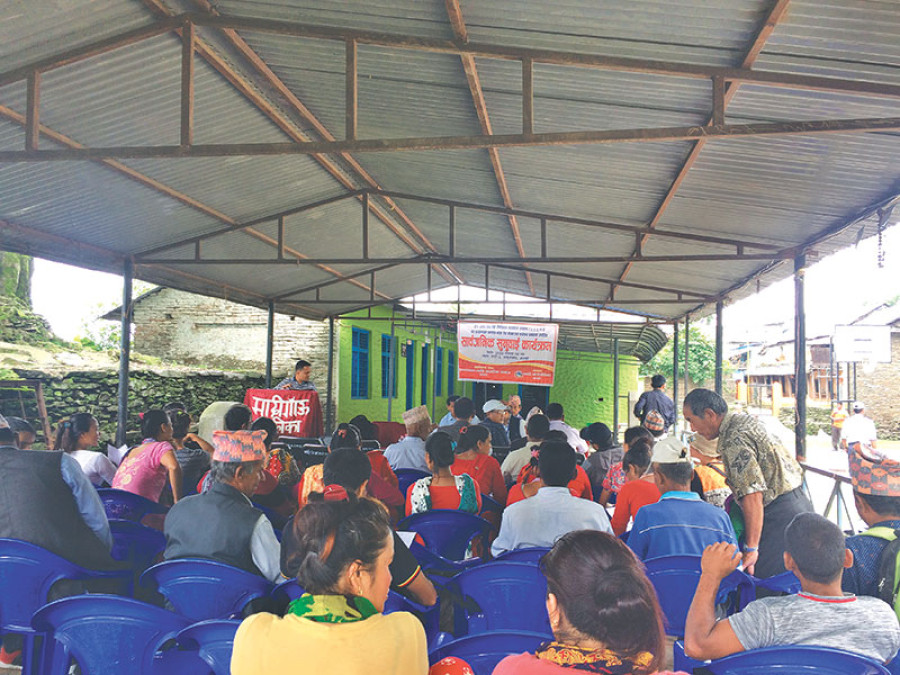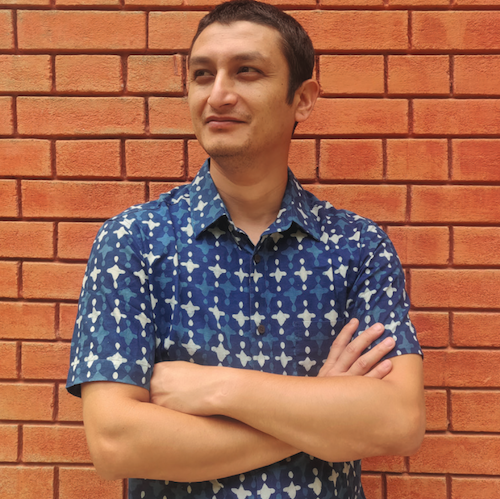Opinion
Lessons from a public hearing
There is much to be desired when it comes to local level governance, but it is taking baby steps nonetheless
Amish Raj Mulmi
Like most people, I dislike being proved wrong. But sitting in a public hearing in Yangjakot village, part of Madi rural municipality in Kaski district, I couldn’t be more pleased at my error. The public hearing is being held under a tin shed across from the rural municipality office, and with about 60-70 participants, it looks full. But there are a group of individuals who sit separate, under a chautara. I wonder if they are from the lower castes; I have been told the village consists of three major groups: the Gurungs, the Bahun-Chhetris, and the Dalits.
My urban liberal sensibilities sends out all sorts of trigger warnings. Is untouchability being practiced even in an official gathering? Are they being left out of this public hearing, supposedly an exercise in transparent governance?
When the turn comes for the participants to question their elected representatives and government officials, two Dalit men ask about untouchability and its practice, and the targeted development funds their community is supposed to receive. My very-urban thesis about lower castes not being present at the public hearing has been demolished. I chide myself at my misplaced assumptions.
The public hearing is organised by Madirural municipality along with Sushasanko Laagi Nagarik Samaj (Citizens for Good Governance), a Kaski district programme affiliated with Transparency International (TI) (disclosure: my father Anand Raj Mulmi was previously associated with the organisation). The hearing is an exercise in transparent governance and better delivery of services after the 2017 local elections. The citizens’ group has tied up with several rural municipalities in Kaski; these hearings are an open space where elected and government officials detail their spending and programmes over the course of the fiscal year. This is the third such hearing in Madi; two others have been held at Thumsikot and Siklisvillages previously in the year.
Focus on ‘prosperity’
Before the hearing begins, we sit down with Ved Bahadur Gurung, the elected chair, where he describes his year in governance to TI officialBhanuParajuli’s queries. It is clear Gurung’s big push will be on roads within his municipality. Throughout our journey to and from Yangjakot, Gurung’s phone rang constantly. The dirt-track that posed as a road was recently widened to 8 metres from 4 metres. But the rains had arrived, and landslides and road slips were common. Excavators were required all over the municipality, and the few they had weren’t enough. At one spot, a bus was stuck in the mud, unable to extricate itself, its passengers waiting for a bulldozer to pull the vehicle out.
Remittance incomes and low agricultural productivity have driven several Madi families to Pokhara, barely 20 kms away. Gurung outlines multiple initiatives to stem this migration. He wants to improve infrastructure, and not just roads. He wants all homes in Madi to have a drinking water tap and electricity supply. He wants to raise incomes by focusing on tourism and hydropower, negotiating terms with companies so that locals own a stake in any potential hydro plant. And finally, he wants to bring in ‘modern agricultural practices’. All of these will raise Madi’s per capita income to national targets, Gurung thinks.
There is a sense of grounded optimism when he talks about what his officials have done in the past year. Seventy percent of the first year’s budget has been spent on roads in Madi; yet, ‘there are no metalled roads in the entire municipality even today’. A km of metalled road costs Rs3 crore; the municipality just does not have the budget to spare.
At the public hearing, Gurung and his officials narrate their expenditures and programmes over the year. By the end, four ward chairs, and various officials from education, agriculture, veterinary services and physical works have spoken, with Gurung ending it with a breakdown of the budget and expenses. Finally, the administrative secretary, Narayan Prasad Adhikari, opens the floor to the public. One can taste the hesitation in the air. He insists no one will be discriminated against, and no official will hold their questions against them. ‘This is a free space,’ he says, and repeats it.
Tale of a goat
Slowly, the queries come. What are the expenses for the targeted development programmes? Is it possible for the municipality to release an advance for development works? Rs10 lakhs was spent on a ward’s roads last year; the sum has increased to Rs40 lakhs, but there seems to be little improvement—why so? Is it essential for the community to contribute 20 percent of costs, or labour, to a development project? A second Dalit man comments that he has noticed the upper castes becoming ‘more arrogant’ towards the untouchables, and wishes for it to be mitigated. He adds, ‘What are the schemes we are undertaking to modernise agriculture in our gaunpalika?’ The respective ward chairs and government officials try to address each one of their queries as best as they can; those they cannot, they ask the individuals to file a request.
Adhikari then insists a woman too must pose a query; finally, one gets up and
asks whether it is possible for the veterinary department to teach them how to castrate goats.
The municipality veterinary chief asks her why she’d need to learn castration when the government provides the service for free. She replies, ‘Because the veterinarian charges me money every time I call him.’ She says she has paid an officer 100 rupees per goat; another concurs. A third man interjects: ‘She’s right. The same officer asked me for Rs3,500 to treat my goat.’
The veterinarian they’ve levied charges on is present at the hearing. He gets up, looks around nervously, and says, ‘I’ve distributed several veterinary medicines for free as required. I also castrate goats for free when people come to our office. But when I have to go to someone’s place, I take Rs100 as fees. This had been the practice when I arrived. I didn’t know the procedures, and I will stop from now.’ The official is chided; one hopes the issue will not crop up the following year as well.
A second veterinarian clarifies the situation with the other goat: ‘We had gone to see the animal together. Some wild animal had taken a bite out of its stomach, and we cannot give the medicine for such an injury for free. We told the owner treating the goat would cost him Rs2,000. I don’t know how he got the figure of Rs3,500.’
The chief veterinarian concludes, ‘During his official hours, no public official is allowed to take money for services he is supposed to provide for free. But at the same time, the public is asked to remember that no official will come to their homes at all times. We will enquire into these queries. We will also discuss whether a training programme can be held to teach castration practices.’
So much to do
Of course, one would be naive to imagine attending a single public hearing can be offered as an example of improved governance practices or wide-scale social changes. Several issues exist: that casteism was practiced was evident through the queries, as were the relatively fewer women participants. The deputy chief, a woman, was absent. Development efforts seemed to be fraught with petty politicking. The entire exercise could also be made more transparent in the coming years, with officials more forthcoming than they were. One could also argue the insistence on expenditure numbers could be used to obfuscate than reveal.
But this doesn’t mean there were no takeaways. Madi residents now knew government officials couldn’t charge them money for simple animal husbandry needs, and Gurung insisted that a community must contribute 20 percent, either as tax or as labour, for a development project as per the central directive. For those of us used to urban lives, these may not hold great value, but they were central to Yangjakot residents. There was also a frankness among them, a sense that the government was not a distant body sitting in Pokhara, or faraway Kathmandu. Their government was right there, and willing to listen to them. If only for tokenism’s sake, this seemed like a tremendous improvement after nearly 20 years of having no elected representatives at local levels.
A recent report by the Democracy Resource Centre highlighted several issues in local level governments across Nepal: restructuring disputes amid charges of gerrymandering, lack of trained officials and understaffing, inadequate budgets, and conflicts between representatives and government officials, and between elected representatives themselves. Gurung flagged several of these issues. He told me rural municipalities like his lacked the legislative or executive powers he thought federalism would provide them. Much of Madi municipality is within the Annapurna Conservation Area Project (ACAP), whose conservation laws often ignore local problems, such as the issue of monkeys raiding farms. But he was optimistic. ‘We are starting from zero. But we will lay the foundations of federalism.’ I couldn’t disagree.
We left Yangjakot in the evening. It had started to pour. Gurung’s phone didn’t stop ringing. All this while, the phrase ‘incremental growth’ kept coming back to my mind. The road was in terrible shape, but it was wider than the previous year. I overheard a conversation where Gurung pulled someone up for not delivering on time. Who knows, maybe the road will remain as it is when his term ends, and Yangjakot won’t have changed, socially or economically. But if the rural municipality gets metalled roads by the end of his tenure, and if these public hearings continue to allow its residents to demand accountability from all officials, there will be room for optimism.
Mulmi travelled with the rural municipality chief and the Transparency International officer to Yangjakot. The public hearing was conducted on June 28




 9.6°C Kathmandu
9.6°C Kathmandu










